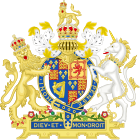Petition of Right

|
|
| Long title | The Petition Exhibited to His Majestie by the Lordes Spirituall and Temporall and Commons in this present Parliament assembled concerning divers Rightes and Liberties of the Subjectes: with the Kinges Majesties Royall Aunswere thereunto in full Parliament. |
|---|---|
| Citation | 3 Car 1 c 1 |
|
Status: Amended
|
|
| Revised text of statute as amended | |
| Petition of Right | |
|---|---|

The Petition of Right
|
|
| Created | 8 May 1628 |
| Ratified | 7 June 1628 |
| Location | Parliamentary Archives, London |
| Author(s) | Sir Edward Coke |
| Purpose | The protection of civil liberties |
The Petition of Right is a major English constitutional document that sets out specific liberties of the subject that the king is prohibited from infringing. Passed on 7 June 1628, the Petition contains restrictions on non-Parliamentary taxation, forced billeting of soldiers, imprisonment without cause, and the use of martial law. Following disputes between Parliament and King Charles I over the execution of the Thirty Years' War, Parliament refused to grant subsidies to support the war effort, leading to Charles gathering "forced loans" without Parliamentary approval and arbitrarily imprisoning those who refused to pay. Moreover, the war footing of the nation led to the forced billeting of soldiers within the homes of private citizens, and the declaration of martial law over large swathes of the country.
In response, the House of Commons prepared a set of four Resolutions, decrying these actions and restating the validity of Magna Carta and the legal requirement of habeas corpus. These were rejected by Charles, who also announced that Parliament would be dissolved; in response, the Commons met on 6 May to discuss alternatives, and concluded that a petition of right was the way forward. Accordingly, a committee under Sir Edward Coke drafted such a petition, and it was passed by the Commons on 8 May and sent to the House of Lords. After three weeks of debates and conferences between the two chambers, the Petition of Right was ratified by both houses on the 26th and 27 May. Following additional debates in which the King restricted the right of the Commons to freely speak, he bowed to the pressure; in need of Parliamentary support for the war effort, the Petition was accepted on 2 June. Unhappy with the method chosen, both houses joined together and demanded the King fully ratify the Petition, which he did on 7 June.
Despite debates over its legal status, the Petition of Right was highly influential. Domestically, the Petition is seen as "one of England's most famous constitutional documents", of equal value to the Magna Carta and Bill of Rights 1689. In a period in which Charles's main protection from the Commons was the House of Lords, the willingness of both chambers to work together marked a new stage in the constitutional crisis that would eventually lead to the English Civil War. The Petition remains in force in the United Kingdom and, thanks to Imperial legislation, many parts of the Commonwealth of Nations including Australia and New Zealand. Internationally, it helped influence the Massachusetts Body of Liberties, and is seen as a predecessor to the Third, Fifth, Sixth and Seventh amendments to the Constitution of the United States.
...
Wikipedia
